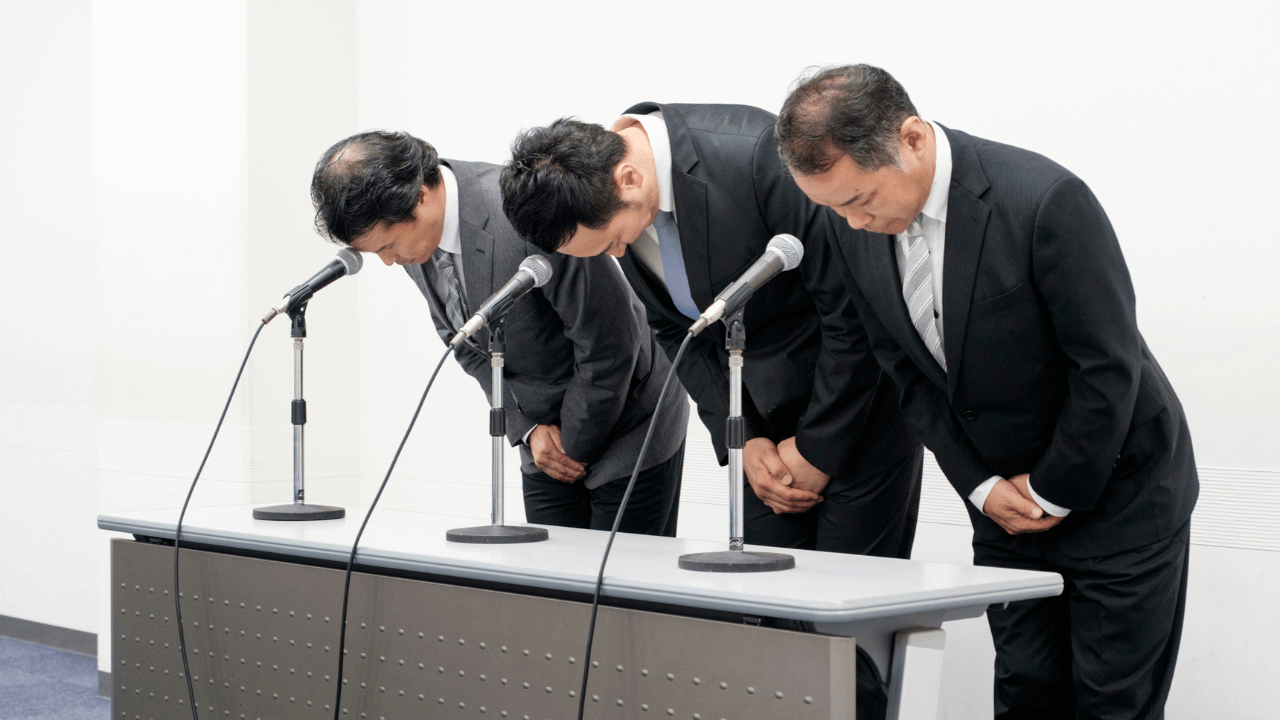
Japanese Way to Make Apologies
Apologizing is a significant part of Japanese culture. Whether it’s for a small mistake or a serious matter, understanding how to express apologies appropriately is crucial for effective communication. In this post, we’ll explore common phrases for apologizing in Japanese, their contexts, and when to use them.
1. ごめんなさい (Gomen nasai) – “I’m Sorry”
ごめんなさい (Gomen nasai) is the most common phrase for apologizing and can be used in various situations. It’s basically “I’m sorry” in English. This phrase is often used for minor inconveniences, informal situation or when you want to apologize to someone relatively close to you such as friends, family, or acquaintances.
Examples:
- You accidentally bumped into someone: ごめんなさい – Sorry.
- You are late for a meeting with friends: 遅くなってごめんなさい (Osoku natte gomen nasai) – Sorry for being late.
If you want to make it more casual, you can simply say ごめん (Gomen).
2. 申し訳ございません (Mooshiwake gozaimasen) – “I Sincerely Apologize”
申し訳ございません (Mooshiwake gozaimasen) is a more formal way to apologize and is used when you want to express deep regret or apology, especially in business settings or with people you don’t know well. This phrase conveys a sense of responsibility and respect.
Examples:
- You made a mistake at work: 申し訳ございません, 私のミスです (mooshiwake gozaimasen, watashi no misu desu). – I apologize, this is my mistake.
- You need to cancel an appointment with a client: ご迷惑をおかけして申し訳ございません (Gomeewaku o okakeshite mooshiwake gozaimasen) – I sincerely apologize for the trouble.
3. すみません (Sumimasen) – “Excuse Me / I’m Sorry”
すみません (Sumimasen) is a versatile phrase that can be used to say “excuse me,” “thank you,” or “I’m sorry,” depending on the context. It is often used for minor apologies or when you want to politely get someone’s attention. This phrase is very commonly used in daily life.
Examples:
- You need to get past someone in a crowded place: すみません (Sumimasen) – Excuse me.
- You forgot to bring something that was needed: すみません, 忘れてしまいました (Sumimasen, wasurete shimaimashita) – Sorry I forgot.
4. ご迷惑をおかけしました (Gomeewaku o okake shimashita) – “I Apologize for the Trouble”
ご迷惑をおかけしました (Gomeewaku o okake shimashita) is used when you want to apologize for causing trouble or inconvenience to someone. This phrase is more formal and shows that you acknowledge the inconvenience caused to the other person.
Examples:
- You were late and caused trouble for others: ご迷惑をおかけしました, 遅れて申し訳ございません (Gomeewaku o okake shimashita, okurete mooshiwake gozaimasen) – I’m sorry for being late.
- You made an error that affected others: ご迷惑をおかけして申し訳ございませんでした (Gomeewaku o okake shite mooshiwake gozaimasen deshita).
5. 失礼しました (Shitsuree shimashita) – “I Apologize for My Rudeness”
失礼しました (Shitsuree shimashita) is used to apologize for being rude or for any behavior that might have been considered impolite. It is commonly used in formal situations or when you feel you may have crossed a line in terms of etiquette.
Examples:
- You interrupted someone while they were talking: 失礼しました (Shitsuree shimashita) – I’m sorry.
- You entered a room without knocking: 失礼しました、今よろしいでしょうか (Shitsuree shimashita, ima yoroshii deshooka). – Sorry, is it okay to come in now?
6. 恐れ入ります (Osore irimasu) – “I’m Very Sorry”
恐れ入ります (Osore irimasu) is a polite and formal way to apologize before asking for a favor. It is often used in customer service or when you need to ask someone for a favor and feel apologetic about it in business situations.
Examples:
- You need to ask your boss to send you a schedule: 恐れ入りますが、スケジュールをお送りいただけますでしょうか? (Osore irimasu ga, sukejuuru o ookuri itadakemasu deshook?) – “I’m very sorry, but could you send me your schedule?”
- You need to ask someone to repeat themselves: 恐れ入りますが、もう一度お願いいたします (Osore irimasu ga, mooichido onegai itashimasu) – “I’m very sorry, could you please repeat that?”
Conclusion
| Phrase | Pronunciation | Meaning | Usage Context | Formality Level |
|---|---|---|---|---|
| ごめんなさい | Gomen nasai | I’m Sorry | Minor inconveniences, friends, family | Casual |
| 申し訳ございません | Mooshiwake gozaimasen | I Sincerely Apologize | Deep regret, business settings | Formal |
| すみません | Sumimasen | Excuse Me / I’m Sorry | Minor apologies, getting attention | Polite |
| ご迷惑をおかけしました | Gomeewaku o okake shimashita | I Apologize for the Trouble | Causing trouble or inconvenience | Formal |
| 失礼しました | Shitsuree shimashita | I Apologize for My Rudeness | Rudeness, etiquette breaches | Formal |
| 恐れ入ります | Osore irimasu | I’m Sorry | Customer service, asking for favors | Formal |
Understanding how to apologize in Japanese is an important part of navigating social situations and showing respect. Depending on the context, the level of formality, and the person you’re speaking to, the appropriate phrase can vary. Whether you’re saying ごめん (Gomen) to a friend or 申し訳ございません (Mooshiwake gozaimasen) in a business setting, using these phrases correctly will help you communicate more effectively and build better relationships in Japan.
Do you have a favorite phrase for apologizing in Japanese? Let us know in the comments below, and share your experiences with using these phrases in real-life situations!
If you want to learn Japanese, improve your skills, or connect with native speakers and other learners, we can help. We offer one-on-one lessons, a supportive community, and on demand courses.
Website: nihongonana.com
Email: support@nihongonana.com
✅Book 1-on-1 lessons: https://nihongonana.com/lessons/
✅Join our community: https://nihongonana.com/community/
✅Access courses: https://nihongonana.com/courses/





Leave Comment